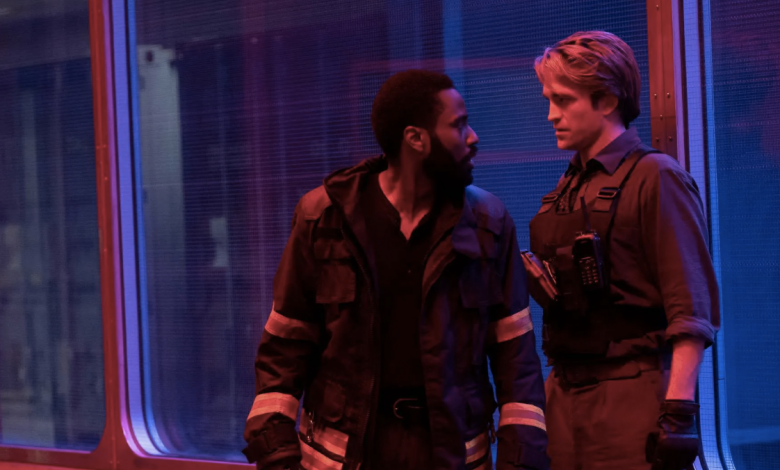The Genius Behind Tenet

Molly Kurpis ’25 / Emertainment Monthly Staff Writer
The world of Christopher Nolan is often known for its complicated storylines, fit with expository dialogue and baffling visuals. This world is further explored by the director’s most recent film, Tenet (2020), released amidst the COVID-19 pandemic. While Tenet is often criticized for Nolan’s most common attributes, the movie’s beauty is often overlooked, and within its flaws lies a misconceived gem of a film.
Tenet focuses on the journey of The Protagonist (John David Washington) as he becomes commissioned to intercept an impending World War III. His mission requires him to travel backwards in time, bending basic laws of physics and nature to prevent nuclear warfare from wiping the world clean. Playing with elements of space and time are common within Nolan films, but one of Tenet’s main issues lies within The Protagonist himself. The character, vague even in naming, is defined by the plot rather than personal characteristics. He exists solely to fulfill his mission: no personal stakes are at risk, and the audience is given no background as to where he came from or what his story is. Though he is an active character, engaging with every part of the world Nolan has constructed, his personality is stagnant, and he remains completely dependent on the plot. While this frustrated a lot of people, making a relatively impersonal character allowed for the complexity of the movie to be further explored. The movie isn’t about who The Protagonist is; it is about what The Protagonist does. His vagueness commands more focus on his actions, making him a blank slate in a seemingly chaotic planet. An easily understood character against a very complicated world gives the audience more film time to understand the world’s complexities. It’s a smart move, but a risky one, as a lot of people felt unsatisfied by The Protagonist’s invisible arc.

Another one of Tenet’s popular critiques resided in the movie’s sound mixing. A lot of viewers had difficulty hearing dialogue, as the music and sound effects were heavily amplified. The Protagonist was required to wear a rubber mask while traveling back in time, fitting the physics narrative but muffling a lot of his lines. While the intentions of amplified sound mixing often resides in a more immersive film experience, a lot of important details were missed, and this experience was cut short by pure confusion. This drawback is elevated by the movie’s gorgeous score composed by Ludwig Van Göransson. The soundtrack, a beautiful composition of strings and percussion, can be played forwards and backwards, still sounding like music either direction. The inverted songs are brilliant, a small detail that frames the beauty of a backworlds world. Göransson’s melodies compliment the film’s intense action sequences, as well as harkening the emotional stakes shared between The Protagonist and his counterpart Neil (Robert Pattinson).

The story of Tenet is told formulaically. A conversation between two or more characters is embedded with exposition and then is demonstrated through stunning visuals. Exposition is Nolan’s kryptonite: his complicated plots would be difficult to decipher without thorough explanations, but it takes away from the film’s experiences when every detail is spelled out between dialogue. Tenet is no exception, and this exposition is elevated due to the strategic worldbuilding that takes place. However, the dialogue showcases the beauty of the story Nolan has curated: his ability to imagine detached from the conventions of everyday life is a gift, and his stories are genius concepts of bending space and time. Tenet’s visuals add to the dialogue. The lack of effects makes each shot so special and visually pleasing to look at. Right down to the actors walking and speaking backwards, Tenet embodies exposition in order to explore as much of this inverted world as possible.
While Tenet may not be perfect, the film contains a multitude of layers hidden within its visuals and musical score. The story is genius, an exploration of space never quite accomplished before. David Washington does a fantastic job embodying the spirit of a true agent, using the resources around him to travel invertedly through time. Nolan’s next film, Oppenheimer, looks to be a pause from his bending of scientific conventions, but still contains an air of Nolanesque that makes his movies unique and compelling, breaking every rule along the way.
Awesome review that helped me appreciate a great movie even more! Thank you for sharing your insights and expertise.